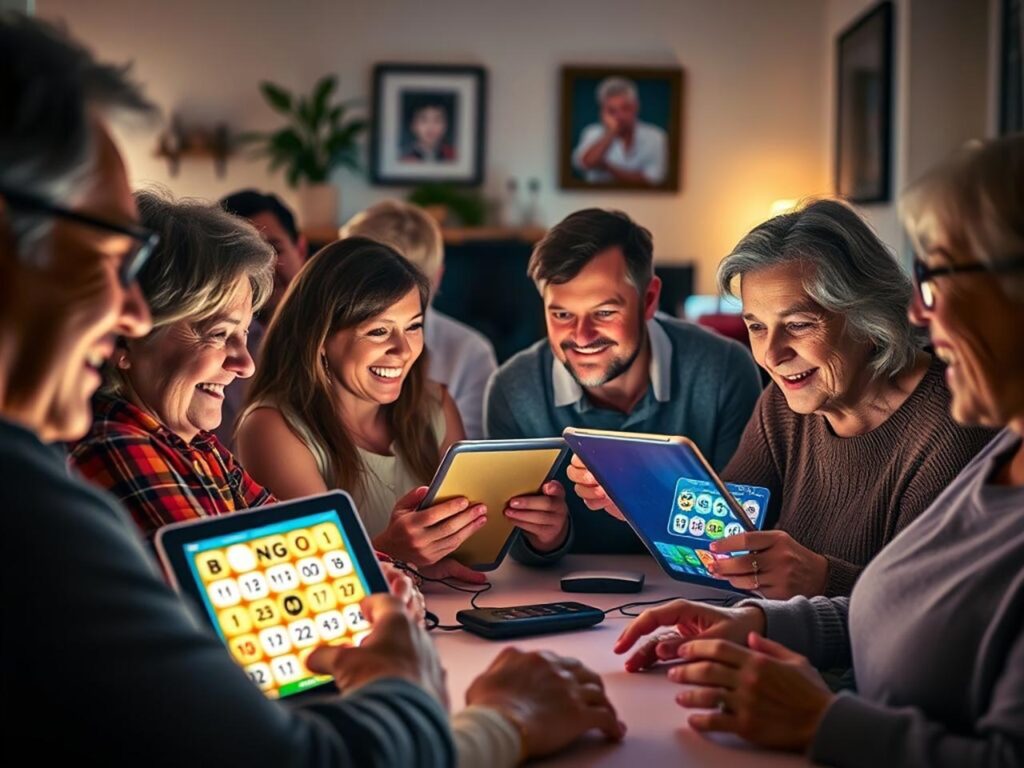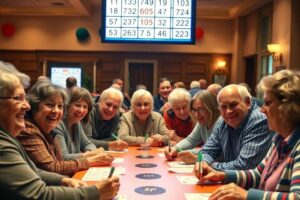There’s a little wave in the U.K. game. A neat 36.5 percent of players now play through the web. That’s one in almost three players. It’s a subtle yet real shift. There is still the old way of going to halls. But more people are now logging on at home.
A New Angle on an Old Game
It is a neat move. The game is the same. You still pick cards. You mark numbers. You hope for a win. But now it happens on a website. There’s something different about the buzz, though. It is not boring. It just feels more immediate. You play from the sofa. You sip tea as you go.
That’s a number from the latest survey. It’s also how much the game jumped into the web. It is easy for people to log in. It is easy to browse rooms. They find games that fit them. The tech has improved. It works fast. They await the next ball draw amid flashing numbers and chatter rings. That draws them in.
The figure might sound small. But it grows year by year. It wasn’t that long ago — just a decade — when next to nobody played exclusively online. Now the web is normal. It is part of the ritual. For some it’s the first time they’ve ever entered a hall. They know the game only through their screen. That is a barometer for how much has changed.
Local Halls Still Matter
This isn’t to say that the hall is dead. Halls still matter. There are some players who prefer the talk you can hear in a hall. They enjoy having the next card show a neighbour. That has a cosy sort of draw. It has weight. But today those cozy relations channel through chat boxes and avatars. One guy (whom you’ve never met) actually kind of sportsmans up and calls “well played” in chat. It lands okay.
Halls now work alongside websites. The website never wipes the hall. Each has its place. Some events are meant to be had in a hall. Big charity games. Classic Quiz‑and‑Bingo nights. There’s still life in those venues.
Yet the web has a fresh role to play. It gives access. An individual can sign on for midday games from a remote village. The web gives choice. It gives more hours. The game plays too large for hall hours. You can begin a game at midday or midnight. It is there when you want it.
The Tech Makes a Difference
Part of why this works is tech. The sites are operated on pretty great software. They load fast. The figures tick up in real time. “Alerts ping as you approach a full house. The chat stays neat. The UI is kind on eyes. The card stays crisp. It does not smear or lag.
That matters. The pull is killed by a frozen screen. No one wants that. A smooth site ensures that you remain in the ride. Nobody has to strain to view their card. No one misreads their numbers.
Throw in safe payments and quick cash-outs. That helps too. Minute workers Some players cash out in minutes. That builds trust. That nudges them back again.
Why Players Are Going All‑In Online
Several things pull folk online. A key one is ease. You tap an app, or you open a tab. There’s no drive. You don’t book a seat. You don’t stand in a queue. You are in.
Next is choice. A site might hold derby races 20 times a day. Each one with slight twists. Different ticket price points. There will be other horrors in these men’s waiting-in-line life, too: different beach-bound women in their various flavors of promo — maybe it’s a free play for a first‑timer. You can cut your budget thin. You choose a game within your budget.
Another is pace. Some games end quick. Others tick long. You pick the pace you like. Halls usually break a certain way. The web allows you to modulate your tempo.
Then there’s the bonus side. A credit that is free is offered by sites. Or a bundle of cheap tickets. That will keep some folks testing out new rooms. That feels fair. You head for a session you might not experiment with in a hall.
Jargon That Rings Familiar
In the know. You will hear about “books,” “calls,” “full house,” “two lines,” “side games,” “dab.” That stays the same online. A “book” is a card. A “call” is when they declare a number. You “dab” a number. A “side” is a small side game. The terms feel just right. You know them. You don’t need new words just ’cause it’s the web.
The parlance of bingo is as crucial now as ever. It links past and present. You speck those words in when you’re chatting in the hall or typing on chat feed. It holds the link.
Community Doesn’t Fizzle
There are fears that going online will be the death of chat and chat mates. But that isn’t true. The site is filled with chat rooms that pour in dozens of nicknames and exchanges and jokes. You might see a friend who plays weekdays at 9 p.m. You might encounter the familiar jokey one who never fails to yell “dab!” where you are just 1 number away. You still feel club‑feel. It barely even happens by text or emoji.
A few even host small contests or quizzes between calls. That keeps the chat moving. They may say ‘What did you get for tea?’ or “Name something that rhymes with jig.” It is light banter. It keeps the mood up.
Mobile Changes the Game
Phones and tablets are major reasons the shift occurred. You can play at the bus stop or in a café. No need to drag a book. The screen fits your thumb. The game’s optimised for your device. You don’t strain your eyes. The calls arrive one by one, loud and clear.
If a telephone rings, the game simply stops. You click on “resume” and move on. It’s your own darn fault, part of the free-falling ease that draws you back, and back, and back.
The mobile internet has made bingo not quite a drop‑in service. Some people crack it for a quick dab or two between chores. Others wait for a night-games. You log in from bed. That wasn’t possible in halls.
What Does This Mean for the Future?
Is the figure higher than 36.5%? Likely. Tech will keep leaning smoother. There will be more options. Regulators are watching. They check safety. It keeps the sites in line. Games must stay fair. That means checks. That means rules. That builds trust.
As more players trust, more move online. They do so bit by bit. Some start with low spends. Some try one game a week. Then they slip to two. Then they take that off the chain and play only in a web browser.
Still, the halls keep shape. They may shift. Some may run “hybrid” sessions. You join via screen, but the numbers are still live‑drawn, in a room. That bonds hall and web.
The Joy of Choice
It all boils down to choice. Going for the club‑feel, in a hall if you like that buzz and know the faces. Or you hit a site if your issue likes the decision and owes easily. Or you do both. The increase to 36.5% indicates that a lot of people prefer the web exclusively. But the remainder maintain halls as part of their routine or take both routes.
No matter how you call or dab or hope, that spark stays unquenched. That pulse of numbers, of makeshift, of aspiration — these remain real. The move to web just takes a new shape.
A Simple Note on That Figure
I would like to take a moment to dwell on the 36.5percent. It isn’t a guess. It is based on data assembled in the spring. It considered players from ages 18 to 70. It asked them how they played. More than a third reported by web only. No halls. That alone marks a shift.
That data also revealed that half of players were now themselves hybrids, switching between hall and web at different points. So it is by no means just an option — it is the routine for a large number of people. But the pure‑online club is gathering steam.
So What’s Next?
Expect software to improve. Look to web games to get smart. Perhaps chat bots will help you in games. Maybe you’ll have voice calls. Themed rooms 90s music, retro, quotes from films. That could be next.
But the core stays. Cards. Calls. That little thrill when you shout “full house.” That stays golden. Just dressed in code.
Final Thoughts
It’s a time when almost 37 percent of bingo‑lovers only play on the web. We have a game rooted in old ways — it dates back far enough to pre-date most of us. And now here it is, formed by tech. It carries its soul forward.
There is a mild thrill in that. You feel like you’re connected to something that’s alive. Whether it’s the hum of the hall or the glare of your screen, the game goes on. And that’s something to smile about.








